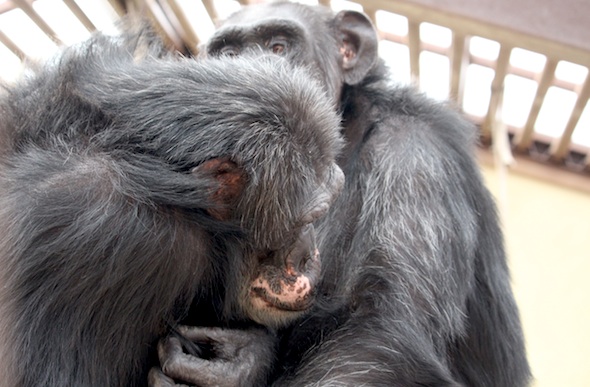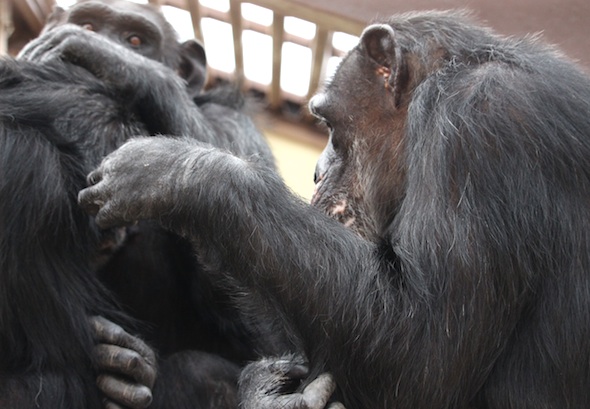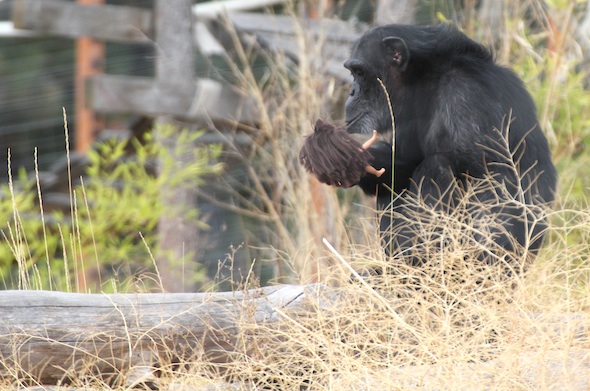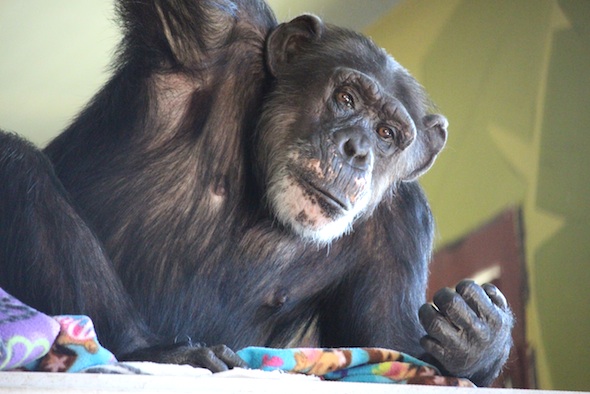It would be easy to compare groups of chimpanzees to the mafia. Or to middle school cliques, for that matter.
Sometimes I worry that we don’t talk enough about this side of chimpanzees.
The side that may seem to contradict the gentle, curious, charming, loving moments, like these photos I took today of Foxie, Burrito, and Missy grooming:
Or this photo of Foxie with a Dora doll, out exploring the hill:
It is absolutely the truth that chimpanzees are caring, loving, warm, goofy, playful, and amazing. And it is absolutely the truth that chimpanzees are brutal, violent, scheming, and dangerous. Often, it is the very bonds that they exhibit with one another that is the flip side of their capacity for violence.
It’s just like humans, when you think about it.
We, like them, constantly separate ourselves into groups – whether the group is a biological family, a mob family, a nation, or a preteen clique. This separation, by definition, means there are those in the group, and then there are those out of the group.
Humans, like chimpanzees and other primates, develop a loyalty to our chosen or assigned group – a need to protect the group from outsiders or any potential harm and a drive to defend our collective territory and resources.
In many ways, I admire this when I observe it in the chimpanzees at the sanctuary. Take Missy, for example. You might not know this, but this 100 pound petite goofball of a chimpanzee can be extremely intimidating:
Missy will defend her group, and Jamie, the group leader, like no one I’ve seen before. When the chimpanzees first arrived in 2008, the humans were definitely the out-group, and Missy reminded us of this frequently. If we attempted (innocently) to pick up dropped food on our side of the caging, Missy would come flying out of nowhere, land directly in front of our face clinging to the caging, scream, and shake the steel. The other chimpanzees would immediately back her up and join in by threat barking and screaming and sometimes spitting water (Jody would almost always go to a fountain and get a huge mouthful of water).
It wasn’t a good feeling when this happened, but I felt it was good sign. First of all – these seven chimpanzees had every right to hate humans. They didn’t hate us, but they certainly had that right based on their past treatment by our species. Second – it really illustrated how solid they were as a group, and these instances probably helped them feel more united in this strange new home.
Missy rarely jumps at us these days. After a few months or maybe a year or so, she seemed to feel less threatened by us. I pick up food in front of her and Jamie all the time, and she now knows I’m just going to give it to her once I pick it up. Plus I’ve learned on an individual basis what each of the chimpanzees is comfortable with, and what they aren’t.
New caregivers have to be more cautious. Trust is not automatic – it has to be earned between primates. And caregivers have to always be on our toes. I know plenty of humans who have been injured by chimpanzees; it happens in a fraction of a second.
We have many rules in place and a very extensive training period for new caregivers. Our basic philosophy is to never put ourselves in a place or position where we can be hurt.
We have a deep respect for each of the chimpanzees – all sides of them, and it’s not our job to try to fit them into our rules of behavior, but rather to respect theirs.








